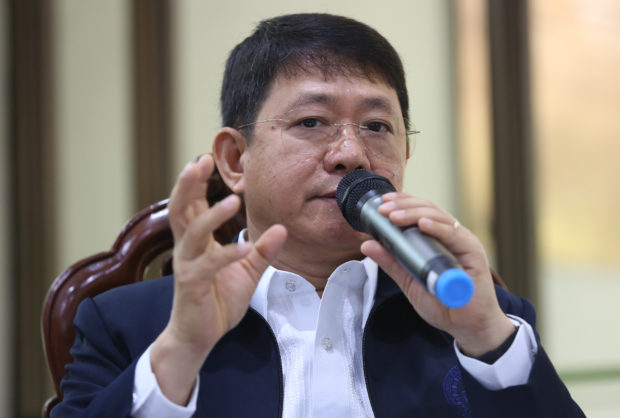MANILA, Philippines — More lawmakers on Monday objected to Interior Secretary Eduardo Año’s plan to publish President Rodrigo Duterte’s list of narcopoliticians ahead of midterm elections in May, saying it would not guarantee that candidates suspected of involvement in the illegal drug trade would lose.
Año announced last week a plan to publish Mr. Duterte’s so-called narcolist, the contents of which, he said, would be thoroughly vetted.
But the Commission on Human Rights objected to the plan on Sunday, reminding the government that suspects are presumed innocent until proven guilty.
Suspects can’t be disqualified
The Commission on Elections (Comelec) on Monday said identifying the narcopoliticians would not automatically disqualify them from the elections.
Comelec spokesperson James Jimenez said only a final conviction from a judicial body could make the Comelec declare the narcopoliticians unqualified to run.
“Since [the narcolist] is not a final conviction, it cannot be disqualifying,” Jimenez said.
Publishing the narcolist is “negative campaigning,” he said, but campaign rules do not prohibit the strategy.
Senate President Vicente Sotto III said on Monday that the Department of the Interior and Local Government (DILG) should just directly speak with the politicians on the list and place them under investigation instead of disclosing their identities to the public.
“The media will surely pick it up and it will then have a basis for their exposure,” Sotto said.
Legal action
As pointed out by Senators Panfilo Lacson and Richard Gordon on Sunday, Senate Minority Leader Franklin Drilon said on Monday that disclosing the contents of the list would only expose Año and other government officials to criminal and administrative suits.
“The DILG should just file cases against these candidates,” said Drilon, a former justice secretary.
Sen. Sherwin Gatchalian also expressed doubt that identifying candidates linked to drug syndicates would spell their political doom.
“Shaming them can only do so much,” Gatchalian said in a text message.
“They have the money and local relationships that will ensure their victory. The best strategy is to remove them [from their present positions] legally through the proper courts,” he said.
Reelectionist Sen. Aquilino “Koko” Pimentel III maintained that the Comelec cannot purge the official list of candidates of narcopoliticians “since they are all presumed innocent until proven guilty.”
File charges
“If the government has included them in a list because the government is convinced, by evidence, of their involvement in the narcotics trade, then it is [the] government’s duty now to file charges against them using the evidence which made them land [on] the said list,” Pimentel said.
Agreeing with Jimenez, Pimentel said “[the] Comelec cannot prevent those on the narcolist from running … because being on a list, even a narcolist, is not a recognized legal ground for disqualifying candidates,” he said.
Lacson earlier pointed out that it was “unjust and unfair” for politicians on the narcolist to be identified because some of them had been erroneously accused of involvement in the illegal drug trade, like what happened to Pangasinan Rep. Amado Espino Jr.
In 2016, Mr. Duterte openly accused Espino, a retired police general and former Pangasinan governor, of coddling drug syndicates in his province.
But the President later took back his accusation and apologized to Espino, admitting that his subordinates who had produced the list were “negligent” in vetting its contents.
On Monday, Akbayan Rep. Tom Villarin called the narcolist a “virtual death warrant” for politicians not allied with the administration.
Gross violation of rights
Villarin said Año’s plan to publish the list smacked of partisan politics and a “gross violation of human rights.”
“The list is a virtual death warrant for politicians and their families who will not only be publicly humiliated but [also become targets] for political killings by death squads,” Villarin said in a statement.
He said the list could be used to target the rivals of politicians endorsed by either Mr. Duterte or the President’s daughter, Davao City Mayor Sara Duterte, who heads a coalition of administration candidates called Hugpong ng Pagbabago.
Mayor Duterte said on Monday that she saw nothing wrong in publishing the list.
She, however, added that the politicians on the list should be given opportunity to answer the accusations against them.
In January, Director General Aaron Aquino of the Philippine Drug Enforcement Agency (PDEA) said there were 83 politicians on the narcolist and most of them were running for reelection.
Aquino said he preferred bringing charges first against the politicians before disclosing their identities, but that he would release the narcolist if ordered by President Duterte.
Go to court
Malacañang said on Monday that it was up to the DILG and the PDEA to decide whether to publish the narcolist.
“Now the fear that it may destroy the presumption of innocence, to my mind there is a judicial remedy,” presidential spokesperson Salvador Panelo told reporters.
“If you feel that you’ve been libeled, you can always go to the courts,” he said.
General Oscar Albayalde, chief of the Philippine National Police, said he would support Mr. Duterte’s decision should the President order the release of the narcolist. —WITH REPORTS FROM TINA G. SANTOS, DJ YAP, JAYMEE T. GAMIL, CHRISTINE O. AVENDAÑO AND JEANNETTE I. ANDRADE
